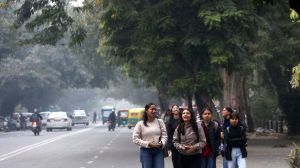Govt sets bizarre rules for foreign trips by judges,HC calls it mindless
Does government have a charitable fund to meet any shortfall on the committed trip expenditure?
While on a private foreign trip,does a judge of the Supreme Court or High Court have no choice except politely refuse a cup of coffee offered by a foreign judge,a sandwich offered by a friendly co-passenger? Is there a competent authority in the central government who will approve private visits of judges? Does the government have a charitable fund to meet any shortfall on the committed trip expenditure?
These are some of the questions being raised after the Law Ministry issued a memorandum detailing new guidelines on foreign visits by judges.
Staying the operation of the circular,the Delhi High Court has pulled up the government for its over enthusiastic behaviour and trashed most guidelines for visits abroad by judges. The court has sought an explanation from the government on the memorandum and its amusing guidelines.
The court direction came on an application by a lawyer who claimed that the executive sought to intrude upon the independence of the judiciary and impose unreasonable restrictions in the name of guidelines.
A division bench headed by Justice Pradeep Nandarajog,while admitting the application,remarked: A mindless exercise has resulted in an over-enthusiastic bureaucrat intermingling the procedures required when a judge makes a foreign visit,which is an official visit,and a private foreign visit.
The row has its origins in a memorandum issued on February 15 by the Law Ministrys Department of Justice,laying down an 11-point comprehensive set of guidelines and instructions for compliance by the CJI and judges of the Supreme Court and High Courts. Guideline Nos. 8 to 10 are at the centre of the row. No. 8 makes it clear that any proposal for a private visit by a judge has to be sent to the Law Ministry for approval,routed via the CJI or the High Court Chief Justice.
No. 9,divided in five sub-rules,lays down several conditions. The approval of leave for private foreign visits shall,however,continue to be obtained from the concerned authority…The complete proposal along with application for private foreign visits of the judges,at their own expenses,for obtaining the approval of the competent authority may be forwarded so as to reach the Department of Justice at least 15 days prior to the commencement of the visit, state 9 (b) and 9 (e).
Justice Nandarajog took strong exception to the use of word competent authority and said: Prima facie,the judges of the Supreme Court and High Courts would not be subject to the administrative control of any authority called the competent authority. We hasten to add that we are not talking on the issue of accountability of constitutional authorities as per the scheme of the Constitution. We are referring to the competence of an authority with respect to administrative matters relating to the personal affairs of judges.
Guideline 9 (c) goes on to state: During private foreign private visits,the judges may not accept any hospitality from any foreign Government/organisation. Foreign Contribution Regulation Act (FCRA) clearance is needed in case hospitality extended by any foreign national/citizen/organisation is accepted.
This prompted Justice Nandarajog to remark: What happens if a judge from India is on a private visit to the UK and chances to meet a judge from the Court of Appeals who is a friend of the judge from India,and he by way of courtesy,requests the judge from India to have a cup of coffee at the Coffee Bar? As per the guideline,the Indian judge cannot accept any hospitality from a foreign national or a foreign citizen and thus the courtesy extended by the judge in England would be required to be politely refused.
Citing the example of a last-minute change in a judges itinerary to meet his or her relative who has now acquired foreign nationality,the bench asked: Before leaving India,since it was not in the itinerary of the judge,no FCRA clearance was obtained. Should the judge refuse to even have a cold drink costing less than a dollar at the residence of his relative who happens to be a foreign national?
A judge may befriend a fellow co-passenger on a coach or liner who offers a sandwich to the Indian judge. As read,the judge from India has to decline the same if the offer is from a foreign national or a foreign citizen.
The court said it was also amused at the 11 terms constituting Para 10 of the policy. The seventh term requires a judge to disclose the source of funding and complete break-up,giving details of the expenditure met and committed,on a foreign private visit. The concluding portion of condition seven uses the expression and balance from the budget allocation.
Do we understand that this means that the government has a charitable fund for the judges of the Supreme Court and the High Court,out of which a shortfall on the committed expenditure by a judge on a foreign visit would be made good; with reference to the budget allocation prima facie,as we read the policy,it means Yes, the bench said.
- 01
- 02
- 03
- 04
- 05































